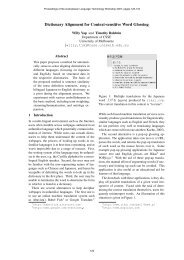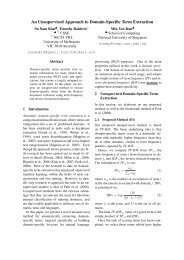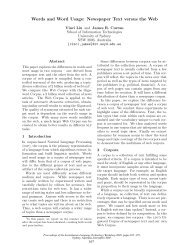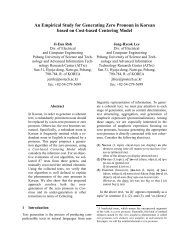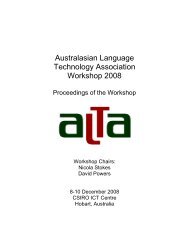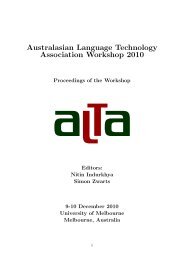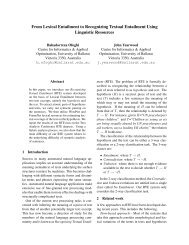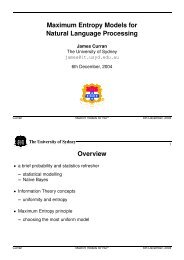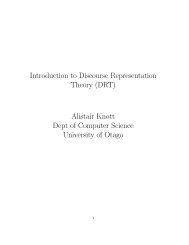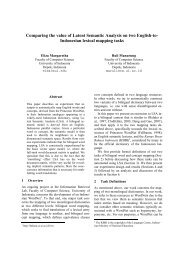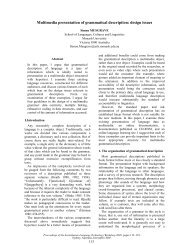Full proceedings volume - Australasian Language Technology ...
Full proceedings volume - Australasian Language Technology ...
Full proceedings volume - Australasian Language Technology ...
Create successful ePaper yourself
Turn your PDF publications into a flip-book with our unique Google optimized e-Paper software.
techniques and results are shown. Finally, we<br />
present our application for cliché scoring.<br />
3 Related Work<br />
There are several areas of research that are<br />
relevant to our topic, such as other studies of<br />
lyrics, analysis of text, and work on rhyme.<br />
However, we have not found any work specifically<br />
on identifying clichés in either songs or<br />
other works.<br />
Song lyrics have previously been studied for<br />
a variety of applications, including determining<br />
artist similarity (Logan et al., 2005), genre<br />
classification (Mayer et al., 2008) and topic<br />
detection (Kleedorfer et al., 2008). Whissell<br />
(1996) combined traditional stylometric measures<br />
with a technique for emotional description<br />
in order to successfully differentiate between<br />
lyrics written by Beatles Paul McCartney<br />
and John Lennon. In addition, several<br />
studies have recently appeared for retrieving<br />
songs based on misheard lyrics (Ring and Uitdenbogerd,<br />
2009; Xu et al., 2009; Hirjee and<br />
Brown, 2010b).<br />
Rhyme in poetry has been studied statistically<br />
for many years (for example a study of<br />
Shakespeare and Swinburne (Skinner, 1941)).<br />
More recently Hirjee and Brown (2009) (Hirjee,<br />
2010) introduced a probabilistic scoring<br />
model to identify rhymes in song lyrics based<br />
on prior study of the complex rhyme strategies<br />
found in Hip-Hop. They define a normal or<br />
‘perfect’ rhyme as ‘two syllables that share the<br />
same nucleus (vowel) and coda (ending consonants).<br />
They found this method more accurate<br />
than rule-based methods and developed a<br />
Rhyme Analyzer application based upon their<br />
model (Hirjee and Brown, 2010a).<br />
In our work, we considered the use of collocation<br />
extraction for finding words that frequently<br />
appear together in lyrics. Smadja<br />
(1993) described several techniques for collocation<br />
extraction and implemented these in<br />
the Xtract tool. The precision of this tool<br />
is tested on a corpus of stock market reports<br />
and found to be 80% accurate. Lin (1998) defined<br />
a method for retrieving two word collocations<br />
using a broad coverage parser and applied<br />
this to compute word similarties. Word<br />
n-grams have been used elsewhere as features<br />
for authorship attribution of text (Pillay and<br />
Genre Proportion<br />
Rock 24.70%<br />
Hip-Hop 21.63%<br />
Punk 13.09%<br />
World 11.17%<br />
Electronic 10.15%<br />
Metal 7.00%<br />
Pop 3.58%<br />
Alternative 3.57%<br />
Other 2.97%<br />
Folk 2.12%<br />
Table 1: Genre distribution of lyrics.<br />
Solorio, 2011; Koppel et al., 2009), and source<br />
code (Burrows et al., 2009).<br />
4 Experiments<br />
Our aim was to detect and measure clichés<br />
in song lyrics. In normal text, clichés are<br />
likely to be stock phrases, such as “par for<br />
the course”. Frequently used phrases can be<br />
found by looking at n-grams or collocated<br />
terms in text. The second source of cliché<br />
in song lyrics arises from rhyme pairs. Due to<br />
the typical subject matter of pop songs, and<br />
the tendency toward perfect rhyme use, particular<br />
rhyme pairs are likely to be common.<br />
Our approach was to obtain a large collection<br />
of song lyrics, observe the effect of different<br />
formulations for ranking rhyme pairs and<br />
collocated terms, then create a cliché measure<br />
for songs based on the most promising ranking<br />
formulae. These were to be evaluated with<br />
human judgements.<br />
4.1 Lyrics Collection<br />
The collection was composed of a subset of<br />
lyrics gathered from online lyrics database<br />
LyricWiki 1 using a web crawler. Song title<br />
and artist meta-data were also retrieved. All<br />
lyrics were converted to lower case and punctuation<br />
removed. Digits between one and ten<br />
were replaced with their written equivalent.<br />
Duplicate lyrics were found to be a problem,<br />
for example the song ‘A-OK’ by ‘Face<br />
to Face’ was submitted three times under different<br />
names as ‘A.O.K’, ‘A-Ok’ and ‘AOK’.<br />
Variations between lyrics included case, punc-<br />
1 http://lyrics.wikia.com<br />
89



